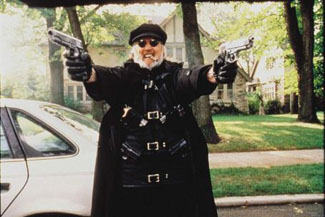|
|
Viking NightThe Boondock SaintsBy Bruce HallAugust 17, 2010
It’s a valid and important question but it is when The Boondock Saints attempts to step back from its comic book shenanigans and seriously address this issue that it falters. The film pays endless homage to scripture, and the MacManuses proselytize ad nauseum as though the sheer volume of it might absolve them of any spiritual penance they will later incur. Eventually the two Irish firebrands begin to make John Kennedy’s inauguration seem subtle in comparison. The spirit of Kitty Genovese is lovingly invoked; a woman whose brutal 1964 slaying caused national soul searching about the role of ordinary citizens in fighting crime. And in what is perhaps the most interesting part of the movie, the end credits roll over a series of man-on-the-street interviews with Bostonians as they debate whether or not the “Boondock Saints” and their brand of vigilante vengeance are morally acceptable. The problem is that this dichotomy weakens the film – on the one hand Troy Duffy clearly wanted to make his own Pulp Fiction, and in this he largely succeeded. But on the other hand, his desire to draw attention to the horror of violent crime seems incompatible with a movie that so brazenly celebrates it. If you’d like to turn off your brain and chuckle at the spectacle of Willem Dafoe in drag, or a skinny Irish boy using a commode as a weapon of mass destruction, then this movie is right up your alley. But if you seriously want to spend some time thinking about crime and punishment, do yourself a favor and just go rent A Few Good Men. And as the Irish say, may God bring good health to the enemy of your enemy.
|

|
|
|

|
Friday, November 1, 2024
© 2024 Box Office Prophets, a division of One Of Us, Inc.


